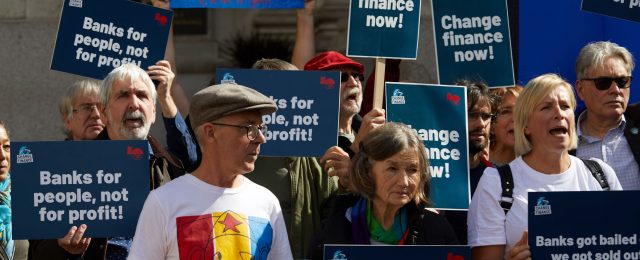Transforming finance for the Decade of Action

Even before the world became subsumed by the COVID-19 pandemic, 2020 was a pivotal year. Kicking off the “Decade of Action,” this was the year that the international community looked to for assessing progress – including in finance and investment – on the Sustainable Development Goals (SDGs).
The pandemic has, of course, exacerbated the urgency of the moment, widening the SDG financing gap of USD $2.5 trillion and starkly highlighting the need for transformative solutions to reform entire systems. Estimates that the global economy may shrink by over 5% this year alone, and that recovering from the pandemic and its impacts could cost at least 10% of global GDP, show us the importance of the finance and investment community in helping to move us towards a more regenerative and resilient economy.
At the World Benchmarking Alliance (WBA), we are working to drive this transformation by assessing and ranking the world’s 2,000 most influential companies on their contributions to achieving the SDGs across seven systems: social, digital, food & agriculture, decarbonization & energy, urban, circular, and finance. We see the financial system as particularly important due to its critical role as an enabler of the other six systems. For example, we can’t talk about decarbonizing the economy without considering how we mobilize the private capital needed to finance a low-carbon future. But we also see the financial system as needing to undergo its own transformation – to act with more long-term time horizons, to move from engaging on sustainability issues from a risk mitigation to an impact creation perspective, and to consider its role in helping to address the systemic drivers of issues such as climate change and inequality. See the list of the world’s 2,000 most influential companies
Achieving this transformation requires us to shine a light on the performance of individual companies within the financial system to recognize high performers, incentivize laggards, and set the bar for action and impact. That’s why – as part of our commitment to benchmark all 2,000 companies by 2023 – WBA is developing a Financial System Benchmark to assess and rank 400 financial institutions on their contributions to the SDGs.
With large, globally diversified operations and investment chains, financial institutions have significant potential to influence companies that have direct or indirect operations in the areas of the world where the effects of not achieving the SDGs will be most acutely felt.
In addition to illustrating how these 400 financial institutions are performing themselves, an important aspect of our work will focus on shedding light on where the impact of these institutions is felt, including in developing, emerging, or frontier markets. With large, globally diversified operations and investment chains, all of them have significant potential to influence companies that have direct or indirect operations in the areas of the world where the effects of not achieving the SDGs will be most acutely felt. For this reason, we are committed to ensuring that the benchmark reflects the expectations and lived experiences of individuals and organizations around the world and across all sectors.
To make sure we get this right, we are running a series of global consultations to begin testing what the benchmark could achieve, exploring what issues it can legitimately address, and how we ensure that it is relevant across geographic regions. Beginning in Japan (with the Financial Services Agency) and moving to the United Kingdom (with the Impact Investing Institute and City of London), Asia-Pacific (with the Asian Corporate Governance Association), India (with the Confederation for Indian Industry), continental Europe (with the Dutch Banking Association), Sub-Saharan Africa (with the Code for Responsible Investing in South Africa), and North America (partner to be announced), we will convene leading voices across the financial system to explore where there are gaps in performance and how a benchmark might help to influence company behavior. In addition to hosting these conversations with influential organizations in each region, we will also bring together important voices from our global, multi-stakeholder Alliance of over 160 organizations, spanning financial institutions, industry associations, reporting frameworks and disclosure standards, (inter)governmental and multilateral bodies, research and academic institutions, and civil society organizations. The insights generated from these consultations will form the basis for a scoping report in early 2021 that will then lay the groundwork for the benchmark’s methodology, with the full benchmark expected to be published by 2023.
This is an ambitious and complex effort, and one that cannot be done alone. In addition to collaborating with our Allies, WBA is proud to partner with the UK Government on driving shared priorities, including on the importance of leveraging private capital and resources for the transition to a low-carbon economy. Our hope is that WBA’s Financial System Benchmark will provide critical data on where institutions are not moving forward quickly enough and where policy and regulation can step in and support progress at the global level. As we begin our consultation phase, we are grateful for the support of the FCDO IMPACT Programme, and look forward to working together to drive momentum on this agenda. Learn more about the FCDO IMPACT Programme
Nine months into the Decade of Action, the stakes have never been higher. Positioning us for an inclusive and sustainable recovery will require levels of ambition, investment, and cross-sector collaboration never seen before. But doing so will be pivotal if we are to transform the financial system and enable it to leave no one behind.
Inspired to learn more? Let us know if you’d like to join one of our consultations or work with us on this journey.